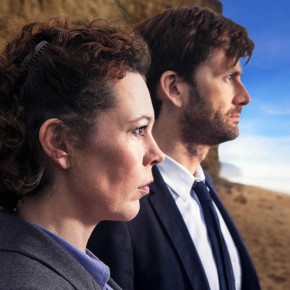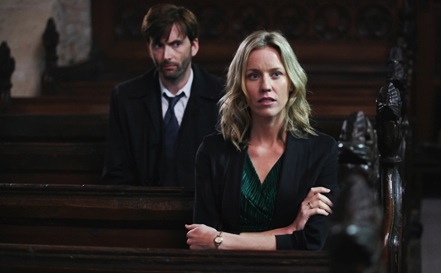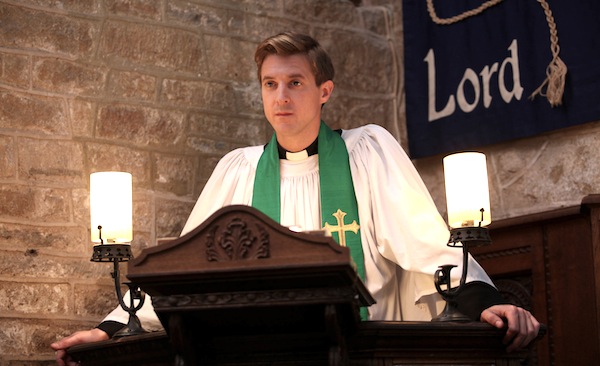
 I am still recovering. This hasn’t happened in awhile. For a variety of reasons our family was home all summer in the delicious humidity which is Annapolis. I’m pretty sure I watched more BBC in two months than I have in my entire life. Yet nothing gripped me enough to write. Until now. Until Broadchurch. Two times through the series in a week. About 11 hours glued to the computer. I am still reeling from devastation.
I am still recovering. This hasn’t happened in awhile. For a variety of reasons our family was home all summer in the delicious humidity which is Annapolis. I’m pretty sure I watched more BBC in two months than I have in my entire life. Yet nothing gripped me enough to write. Until now. Until Broadchurch. Two times through the series in a week. About 11 hours glued to the computer. I am still reeling from devastation.
Yes, it’s one in a multitude about the murder of a child and the search for a killer. This takes place in the gorgeous cliff side town of Broadchurch, England; the cinematography is breathtaking and that alone is reason to watch. Of course, you have the Brits who apparate between shows like Dumbledore and they are glorious. David Tennant is Alec Hardy, primary detective, and this is the David Tennant I have been craving (I’m still reeling from his Dr Who exit). Also Arthur Darvill (Rory from Dr. Who) plays the town vicar, and he is brilliant. What has struck me most is the slow, steady study of human emotion–grief, fear, guilt, anger… Faces full of pain, of anguish. Even a third time through, I felt my soul being wrenched in two at some points.
Broadchurch is a tiny town, a seemingly tight knit community. In episode 1 a character comments that Broadchurch is where “we celebrate the everyday.” From the opening scenes, the viewer is given the impression that most everyone knows each other intimately. The town is a rosy picture of what people mean when they drop the buzzword “community.” Yet as the reality of Danny’s murder hits, we are given a glimpse into what the truth of that intimacy and community really is. In episode 2, DI Hardy is challenging his partner, DI Miller, that she MUST look at her community from the outside, she must trust no one. By episode 3, he remarks “you never really know anyone.” Suspicion becomes everyone’s MO and trust breaks down even between husband and wife. The erosion continues as the suspects, ordinary townsfolk, are slowly questioned. Again, the way faces are filmed is extraordinary–as if we are given the opportunity, maybe even the responsibility, to gaze into the soul and either share the pain, the fear, the agony, or, perhaps, harbor suspicion. Were there the true intimacy as indicated at the beginning of the show, the first would definitely be accurate. At least that is my experience with those I feel closest to. But hand in hand we experience the suspicion, the doubt, even hate. This is also part of true human experience.

It feels that underneath all of this pain, the question that lurks down deep is “am I known? Who really knows me and do I really know anyone?” What would true intimacy, true community look like? David Tennant’s character has a line in episode 4 that is intended as humor, but evoked a main truth of the series in my opinion. As he shows up for dinner at his partners home, his awkward social self takes center stage. DI Miller asks if she can call him by his first name, Alec, and he asks “Why do we have to create some false intimacy by calling each other by first names?” The line, as is the scene, is funny, but also belies a lurking unbelief in intimacy and, I suspect, a sadness of its absence. The next four VERY TENSE episodes explore the erosion of identity as secrets are exposed, as the truth about individuals is made known. As DI Hardy says in the final episode, “People are unknowable… You can never really know what goes on inside someone else’s heart.”
Whilst this might cause some of you to want to skip Broadchurch, might advertise it as depressing, negative, etc… Don’t. Yes, there is the deep truth of Jeremiah 17:9 “The heart is deceitful above all things, and desperately sick; who can understand it?” Yet, there is also a hope lurking.
As David says to Solomon, “…for the Lord searches all hearts and understands every plan and thought.” Jeremiah 12:3 says, “But you, O Lord, know me; you see me, and test my heart toward you.” In our modern world, it seems so many live in the terror of not being known, even with the constant gaze and buzz of technology and social networking: perhaps being able to create our own profiles, to “brand” ourselves, yet knowing what is actually true about our own selves, exacerbates the horror.
Is it, then, a comfort that we are known by an omniscient, omnipotent God? Broadchurch might open the door for despair of humanity, but it also opens another door.
Much as I love my Brits, some of my favorite shows I haven’t written about because… nothing comes. Dr. Who–entertaining and humanistic. Inspector Lewis, which I adore, usually involves problem priests and an edge that wants to mock religion. Broadchurch has created a religious character that, although flawed, is actually revered and respected and… real. The one thing that seems to bring the people out of their suspicion, grief, pain is–surprisingly–the church or the vicar’s faith.

The three excerpts of sermons quote appropriate Scripture but in a way that actually seems true, authentic. Paul, the vicar, obviously struggles and admits he doesn’t have the answers. But he is clearly a shepherd; he pursues his people even though they might not be part of the congregation, even when they say “I don’t know if I believe in God.” The boy’s desperate parents turn to Paul for counsel saying “you know us” after earlier rejecting Paul’s offers for help, hostile towards any spiritual words. When it is Paul’s turn to sit in the police station under the glare of suspicion, he becomes livid at DI Hardy’s accusation that he “muscled in” and took advantage. Paul speaks truth: “You Have no concept of faith, do you?… Do you know why they came to me? Because there was a fear you couldn’t address, a gap you couldn’t plug, because all you have is suspicion… You do not get to belittle my faith because you have none. People need hope…”
Twice Paul pleads with his people. First he rebukes the flock for their failure of each other: “In this, the darkest of times… love thy neighbor as thyself. If we are not a community of neighbors, we are nothing.” During the last episode Paul pleads with his people via Ephesians 4:31-32 to put away bitterness, wrath, anger, clamor, and slander and to forgive: “…after what we’ve been through we have a responsibility to each other and to our God.” Amidst devastation there is hope. Regardless of the facade of intimacy, now is the opportunity for true community–through “the valley of the shadow of death.”
In my small world there is a lot of talk about “community” and what the church is supposed to be. I struggle with the failure of the Church in this area. Broadchurch may only be a TV show, but it illuminates the reality behind the buzzword: our need for true community in dark places. The show even offers a tiny and unexpected hope that the Church can still be “the aroma of Christ to God… The fragrance from life to life.”

COMMENTS
4 responses to “Suspicious Communities and Hopeful Vicars in BBC’s Broadchurch”
Leave a Reply













My wife and I also enjoyed “Broadchurch”, right through the painful emotions of (BBC America) last night’s last episode
And of course “broad-church” is an apt name for “the parish”.
“pursues HIS PEOPLE even though they might not be part of the congregation,”
Anglicanism as the remnants of Christendom, the continued rejection of ‘voluntary churches
what’s this identity we want? the identity of individuals?
what’s this intimacy we want? between individuals with individual identities?
Maybe it’s not theories about predestination which caused the isolation of individuals.
Maybe late/modern capitalism is a result of who we always were, just as much as we being who we are now is a result of late/modern capitalism
Broadchurch scratched my Rectify itch these past few weeks. I was obsessed to the point of wanting to go visit the town. It was like a post-modern Agatha Christie novel where the community fractures into its individual splinters. I was hooked though I did have to rewind several times to figure out what they were saying. I thought the recovering alcoholic priest and DI Hardy’s relationship was most interesting and of course, I kept thinking “this is some MBird material going on here”. Thanks for the confirmation.
I know I’m a bit late to the party, but thank you so much for this post. It encourages me to see a Christian reaction to this. I’m the only person I know that has seen it, and I’ve been dying to talk it through with someone ever since I saw the finale.
I was fooled by the intimacy of the Broadchurch community, so when the ending did come, I was pretty devastated, but you’re quite right, even at the beginning the relationships were shallow, close only geographically. It was telling that Paul, the vicar, was the only one who saw clearly enough that God had given Beth “not what you want, but what you need.”
All this recalls the theme in Dickens’s wonderful novel, A Tale of Two Cities:
“A wonderful fact to reflect upon, that every human creature is constituted to be that profound secret and mystery to every other.”
Just binge-watched season 1 of Broadchurch. I’m stunned, quite honestly, by the deeply Christian aspect of it. To wit:
When Beth sees the ultrasound image of her baby in the womb, one she had thought she would have to abort .. well, that scene was about as pro-life as you can get. It was almost a polemic.
When Jack Marshall quotes the Lord’s Prayer…
When Paul the Vicar quotes Paul the Apostle …
When the community gathers in the church to seek solace …
When adultery is rejected wholesale …
There was such a probing look into the human heart with all it’s dark recesses, then an application of grace. Wonderful series, the best I’ve seen in years.